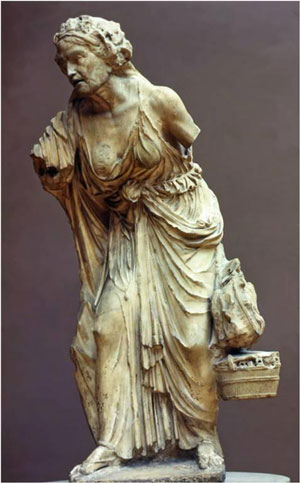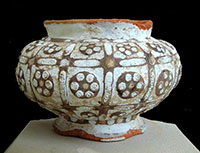
Hellenistic economy: a sculpture of a woman selling vegetables at the market
Mercenary soldiers
After the Peloponnesian War was over in 404 BC, everyone in Greece was poorer than before, and many men who had been soldiers were out of work. So a lot of those men went to be mercenary soldiers for Persia. A Greek general named Xenophon wrote about what it was like fighting for Persia.
Other things had changed too: the silver mines at Laurion were running out of silver, and the Romans were conquering Greek colonies in south Italy and Sicily. The Greeks and Carthaginians didn’t control the Western Mediterranean anymore, though they still sold plenty of stuff to the Romans.
Silk Road trade
On the other hand, the Hellenistic period saw the rise of the Silk Road through Central Asia. There were good, safe roads and a lot more caravan trade east and west across Asia than there had been before. The Greeks sold more wine and perfumes, jewelry, and wool cloth towards the east. Greek artists worked at Persepolis (in modern Iran).

Chinese vase with Greek glass dots (ca. 300 BC)
When Alexander‘s father conquered Greece, and then Alexander conquered all of West Asia in the 330s and 320s BC, the Greek economy picked up again. Greek traders were able to travel all over West Asia, all the way to India, selling their wine and olive oil, and buying cinnamon, pepper, medicines, silk, pearls, cotton, and knotted rugs. In Egypt, the Ptolemies also encouraged sea trade between Egypt and India using the recently discovered monsoon winds and currents. The Hellenistic period was a good time for the Greeks – until the Romans conquered them in the 100s BC.
How many Hellenistic Greek trade items can you find in your house?
More about Roman Greece
Bibliography and further reading about the Hellenistic economy:
Trade & Warfare, by Robert Hull (2000).
The Ancient Economy by Walter Scheidel, Sitta Von Reden (2002). A collection of essays by different specialists, but written for the non-specialist.
Economy and Society in Ancient Greece, by Moses Finley (revised edition 1983)
The Ancient Economy, by Moses Finley (revised edition 1999). This has been the starting point for academic discussions of the Greek and Roman economy since it first came out thirty years ago.
The Class Struggle in the Ancient Greek World: From the Archaic Age to the Arab Conquests, by G.E.M. De Ste Croix (1989). A Marxist interpretation.
Hellenistic Economies, by Zofia H. Archibald, John Davies, Vincent Gabrielsen, G. J. Oliver (2001). By specialists, for specialists.





Correction: When Alexander “united” Greece. He and his other Greek allies conquered Athens and Thebes who would not join the rest of the Greeks under Macedonian hegemony. United under Macedonian hegemony the Greeks moved to Asia Minor to liberate the Ionian Greek colonies from the Persian yoke.
I’ve corrected the line to note that Alexander’s father conquered Greece, but certainly this was not a voluntary alliance, nor did the Greeks consider themselves to be one united people after they were conquered, or for long afterwards. Nor did the Greeks move to attack Asia Minor: that was still Alexander’s decision and leadership, and he’s not Greek.